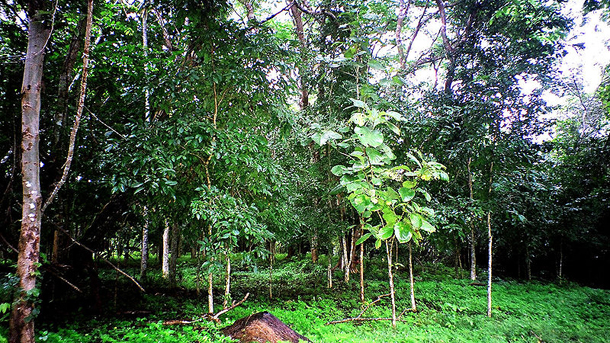Burma’s forests and unique fauna and flora will struggle to survive as the country opens up to foreign business investment.
That’s the warning from international organizations which say the threat comes from companies being squeezed in their own countries by environmental laws or land shortages due to palm oil and wood pulp production.
Decades of isolation have helped to keep Burma’s native forests relatively intact, but political reforms which are opening up investment opportunities are attracting Malaysian palm oil producers in particular.
One of the world’s biggest palm oil producers, Felda Global Ventures Holdings, has just announced it is talking with the Burmese government on possible investment.
Another big Malaysian palm plantation developer, Astral Asia, has previously shown interest, saying land and labor costs were cheaper than at home.
Felda president Sabri Ahmad was among a large Malaysian business delegation which recently visited Burma to look at opportunities.
“He noted that the southern region of Myanmar was suitable for oil palm plantations, while the central and northern regions were suitable for sugar cane,” The Star newspaper of Kuala Lumpur reported last week in an interview with Felda’s Sabri.
Felda wants to expand its oil palm land bank “as the potential for expansion domestically [in Malaysia] is limited,” The Star said.
Isolation and neglect under military rule has, ironically, helped preserve large tracts of primary tropical forest, but trees are now disappearing at an alarming rate.
Illegal logging and land clearance for palm oil plantations have caused serious damage in recent years, and without stronger state controls and monitoring Burma could soon find itself as denuded as neighboring Thailand, and facing local community conflicts as in Indonesia and Cambodia.
Loss of forests, especially on hillsides, is held partially responsible for the severity of Thailand’s huge floods late last year which caused damage estimated by the World Bank at over US $45 billion.
Burma forms a key part of a region of Southeast Asia which is being closely monitored by a London wildlife charity called Indo-Myanmar Conservation. The region, dubbed the Indo-Myanmar Hotspot, extends from Bangladesh to Vietnam.
“In Myanmar, palm oil plantations are threatening the hotspot’s largest remaining lowland evergreen forest, its richest forest ecosystem,” says a report by Indo-Myanmar Conservation, which has scientists operating inside Burma. “The 1999 logging ban in China has resulted in massive logging of Myanmar’s northern forests, the world’s richest temperate forests.”
“Very little conservation takes place in Myanmar, despite the great need,” says the NGO group. “Myanmar’s fantastic array of wildlife is disappearing rapidly in the face of habitat loss and unsustainable hunting, much of it for export to China.”
Two other nature organisations, Fauna & Flora International (FFI) of Cambridge in England, and Mongabay of the United States, warn that increased human activity, including hydroelectric dam projects in northwest Burma, threaten the survival of much rare wildlife.
FFI has already put a newly discovered mammal species, the snub-nosed monkey, on the endangered list because its habitat is “coming under pressure from increased logging and development, including one of Asia’s largest hydropower development schemes.”
According to the UN’s Food and Agricultural Organization (FAO), Burma is “still endowed with one of the most extensive natural forest covers in the world.”
“Closed and degraded forests, which can be considered as actual forest cover, constitute 344,237 square kilometers or approximately 51 percent of the total area of the country,” says the last FAO study on Burma.
But Mongabay’s research presents a far less cozy picture.
“Myanmar has one of world’s highest deforestation rates, which is at least partly driven by China’s rising demand for commodities,” the NGO said in a environmental report. “Between 1990 and 2010, Myanmar lost 19 percent of its forest cover, or around 7,445,000 hectares,” it wrote.
That’s an area larger than the entire Republic of Ireland.
As political reforms start to open up Burma to economic development, it’s the country’s natural resources which are initially attractive: oil, gas, valuable and coveted timber such as teak, and land and climate ideal for large-scale agricultural commodities such as palm oil, sugar cane and rubber.
China’s demand for wood has already made inroads into northern forests, while the big palm oil producers are keen to expand their “land banks” in the south.
Some of the world’s biggest palm oil producers are based in Malaysia but many moved into Indonesia a decade ago for the same reason they are new eyeing Burma—cheaper land and lax environmental laws on deforestation.
In Indonesia, however, a combination of domestic environmental NGOs opposed to forest loss and Western countries paying to keep forests by buying carbon credits has put the palm oil industry there under new pressures.
Malaysia’s Felda worldwide manages 880,000 hectares of plantation—14 times the size of Singapore—and is engaged in rubber and sugar cane production as well as palm oil. It produces 3 million tonnes of crude palm oil per year, about 8 percent of the world’s annual output.
Felda’s Sabri said his firm is particularly interested in developing palm plantations in southern Burma, with access to its processing mills in Malaysia, and sugar cane plantations in central and northern regions.
Rival Malaysian palm oil producer Astral Asia had plans to clear up to 60,000 hectares of southern Burma forest—the same land area as Singapore—but a $200 million investment plan with a military linked firm, Myanmar Combiz Services Company, soured.
Meanwhile, Singapore-based Asia Pulp & Paper (APP), one of the world’s largest paper manufacturers, has established a development office in Rangoon.
APP is under intense criticism and pressure from Western countries and NGOs for its activities in forests in Indonesia and other parts of Southeast Asia, and has been frequently accused of using wood illegally logged.
The question waiting to be answered is: Will the Burmese parliament and government be able to balance growth with conservation through sustainable development codes?

















